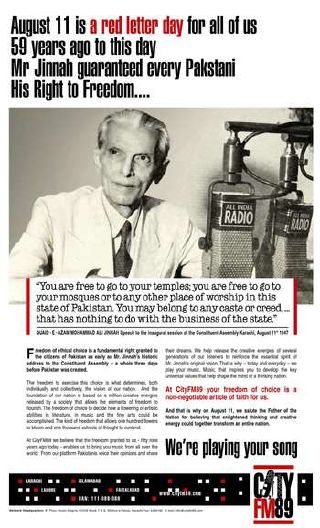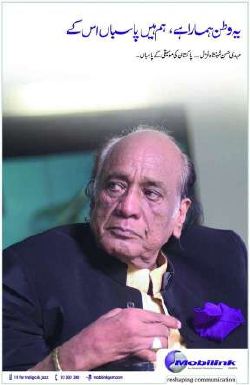Adil Najam
 What an amazingly poignant and powerful advertisement. And how timely.
What an amazingly poignant and powerful advertisement. And how timely.
Published in Dawn (11 August, 2006) as a full page ad for the radio station City FM 89 it highlights what I believe to be one of Mr. Jinnah’s most evocative and inspiring speeches. Certainly one that is most relevant to Pakistan’s present as well as future. The key quote is printed right below his photograph:
“You are free to go to your temples; you are free to go to your mosques or to any other place of worship in this state of Pakistan. You may belong to any caste or creed — that has nothing to do with the business of the state.”
Of course, his vision was not always followed. But on this, the eve of Pakistan’s Independence Day, there could not be a more timely moment to remind ourselves what the vision was.
City FM 89 also has a full day of special music planned for August 14, which by the looks of its sounds very enticing. For example, I would love to find out what their list of the ‘Top 50 Pakistani Songs’ look like. Whatever that list might look like, it is bound to have multiple entries from the incomparable Shahenshah-e-ghazal: Mehdi Hassan.
And that brings me to the second advertisement I saw, also in Dawn (12 August, 2006). This ad also spoke to my sensibilities.

First, this advert from Mobilink pays tribute to one of our greatest artists. That is something we do not do often enough; and do not do very well when we do it.
Moreover, the Urdu verse at the top — yeh watan hamara hai, hum hain pasbaan iss kay — comes from what I think is one of the most moving Pakistani national songs ever (commentary and link to the song here; more ATP posts on this here and here).
Most of song is in the ‘words’ of Mr. Jinnah so that ‘humara‘ (ours) in that line is ‘tumhara‘ (yours) in the song. But the intent is quite clear: we have to make of this country what we make of it. Even as a kid, this song always mesmerized me both for how Mehdi Hassan sang it and even more so for the words…. hum tou mehz unwaaN thay, asl daastaN tum ho!
Unlike so many other milli naghmay which were really naara baazi set to music, this one had a clear and powerful message. It seemed to me that Jinnah was saying to all of us: ‘guys, my time is up, I have done what I could, now its your turn; do the best you can and make the best of what you have.’ Of course, neither he nor the song was saying exactly that. But that is what I took from the song.
It was always a poignant song, but also an uncomfortable song. Because one always knew that we had not really lived up to the responsibility placed on us.




















































miriam yes but its surprising after reading this
Sohaib, when I said “Pakistan was created for Peace”, I meant it was created to stop the bloodshed (and possibly hatred). The animosity between the two communities had reached a tipping point. Hence TNT probably made sense then.
But, it (TNT) doesn’t make sense now. The nation needs to move away from it — rediscover the concept of its nationhood that gives space to a diverse culture instead of a monolithic one. A secular Pakistan can’t afford to have indoctrination of TNT in its textbooks.
A correction:
*This obviously does not mean that I DONT love the country,
I always find discussions about the creation of Pakistan and its justifications to be fascinating. Being a kid brought up amongst history books which have everything but history and hence cause extreme disillusionment, followed by a heavy dosage of the real story, I have somehow stopped believing in the rationale of Pakistan. To me, it probably wasn’t necessary. A good idea, but not worth the bloodshed and hatred.
This obviously does not mean that I love the country, and that is also not simply because of lack of other countries I could call home and love. Heck no, I am deeply patriotic, and the songs that move you move me equally, if not more. What I firmly believe in is something a friend of mine said in a completely off-hand manner:
“Mulk mazhab kuch nahin hota, sirf log hotay hein.”
I think we ignore the real deal too often, the people. Yes it’s all well and good to talk about Pakistan and its necessity and importance and brilliance, what it’s about time we start focusing on Pakistanis. Jo hogaya so hogaya, ab agay ki socho. We are already a downtrodden, misunderstood, poor nation. We need policies that will uplift our people, not justifications for why they plow their land and till their farms on one side of a border rather than the other.
:)
Thanks for the link, Adil.